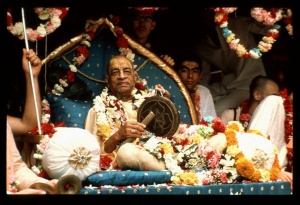CC Adi 17.42 (1975): Difference between revisions
(Vanibot #0027: CCMirror - Mirror CC's 1996 edition to form a basis for 1975) |
(Vanibot #0020: VersionCompareLinker - added a link to the Version Compare feature) |
||
| Line 2: | Line 2: | ||
<div style="float:left">'''[[Sri Caitanya-caritamrta (1975)|Śrī Caitanya-caritāmṛta (1975)]] - [[CC Adi (1975)|Ādi-līlā]] - [[CC Adi 17 (1975)|Chapter 17: The Pastimes of Lord Caitanya Mahāprabhu in His Youth]]'''</div> | <div style="float:left">'''[[Sri Caitanya-caritamrta (1975)|Śrī Caitanya-caritāmṛta (1975)]] - [[CC Adi (1975)|Ādi-līlā]] - [[CC Adi 17 (1975)|Chapter 17: The Pastimes of Lord Caitanya Mahāprabhu in His Youth]]'''</div> | ||
<div style="float:right">[[File:Go-previous.png|link=CC Adi 17.41 (1975)|Ādi-līlā 17.41]] '''[[CC Adi 17.41 (1975)|Ādi-līlā 17.41]] - [[CC Adi 17.43 (1975)|Ādi-līlā 17.43]]''' [[File:Go-next.png|link=CC Adi 17.43 (1975)|Ādi-līlā 17.43]]</div> | <div style="float:right">[[File:Go-previous.png|link=CC Adi 17.41 (1975)|Ādi-līlā 17.41]] '''[[CC Adi 17.41 (1975)|Ādi-līlā 17.41]] - [[CC Adi 17.43 (1975)|Ādi-līlā 17.43]]''' [[File:Go-next.png|link=CC Adi 17.43 (1975)|Ādi-līlā 17.43]]</div> | ||
{{CompareVersions|CC|Adi 17.42|CC 1975|CC 1996}} | |||
{{RandomImage}} | {{RandomImage}} | ||
==== TEXT 42 ==== | ==== TEXT 42 ==== | ||
| Line 18: | Line 17: | ||
<div class="synonyms"> | <div class="synonyms"> | ||
nitya rātre—every night; kari—I do; āmi—I; bhavānī-pūjana—worship of Bhavānī, the wife of Lord Śiva; āmāra—my; mahimā—glories; dekha—you see; | nitya rātre—every night; kari—I do; āmi—I; bhavānī-pūjana—worship of Bhavānī, the wife of Lord Śiva; āmāra—my; mahimā—glories; dekha—you see; brāhmaṇa-sat-jana—all respectable brāhmaṇas. | ||
</div> | </div> | ||
| Line 25: | Line 24: | ||
<div class="translation"> | <div class="translation"> | ||
"Gentlemen, every night I worship the goddess Bhavānī. Since the paraphernalia for the worship is present here, now all you respectable brāhmaṇas and members of the higher castes can understand my position." | |||
</div> | </div> | ||
| Line 32: | Line 31: | ||
<div class="purport"> | <div class="purport"> | ||
According to the Vedic system there are four | According to the Vedic system there are four castes-the brāhmaṇas, kṣatriyas, vaiśyas and śūdras-and below them are the pañcamas, who are lower than the śūdras. The higher castes-the brāhmaṇas, the kṣatriyas and even the vaiśyas-were known as brāhmaṇa-saj-jana. The brāhmaṇas especially were known as sajjana, or respectable gentlemen who guided the entire society. If there were disputes in the village, people would approach these respectable brāhmaṇas to settle them. Now it is very difficult to find such brāhmaṇas and saj-janas, and thus every village and town is so disrupted that there is no peace and happiness anywhere. To revive a fully cultured civilization, the scientific division of society into brāhmaṇas, kṣatriyas, vaiśyas and śūdras must be introduced all over the world. Unless some people are trained as brāhmaṇas, there cannot be peace in human society. | ||
</div> | </div> | ||
Latest revision as of 16:40, 26 January 2020

A.C. Bhaktivedanta Swami Prabhupada
TEXT 42
- nitya rātre kari āmi bhavānī-pūjana
- āmāra mahimā dekha, brāhmaṇa-sajjana
SYNONYMS
nitya rātre—every night; kari—I do; āmi—I; bhavānī-pūjana—worship of Bhavānī, the wife of Lord Śiva; āmāra—my; mahimā—glories; dekha—you see; brāhmaṇa-sat-jana—all respectable brāhmaṇas.
TRANSLATION
"Gentlemen, every night I worship the goddess Bhavānī. Since the paraphernalia for the worship is present here, now all you respectable brāhmaṇas and members of the higher castes can understand my position."
PURPORT
According to the Vedic system there are four castes-the brāhmaṇas, kṣatriyas, vaiśyas and śūdras-and below them are the pañcamas, who are lower than the śūdras. The higher castes-the brāhmaṇas, the kṣatriyas and even the vaiśyas-were known as brāhmaṇa-saj-jana. The brāhmaṇas especially were known as sajjana, or respectable gentlemen who guided the entire society. If there were disputes in the village, people would approach these respectable brāhmaṇas to settle them. Now it is very difficult to find such brāhmaṇas and saj-janas, and thus every village and town is so disrupted that there is no peace and happiness anywhere. To revive a fully cultured civilization, the scientific division of society into brāhmaṇas, kṣatriyas, vaiśyas and śūdras must be introduced all over the world. Unless some people are trained as brāhmaṇas, there cannot be peace in human society.